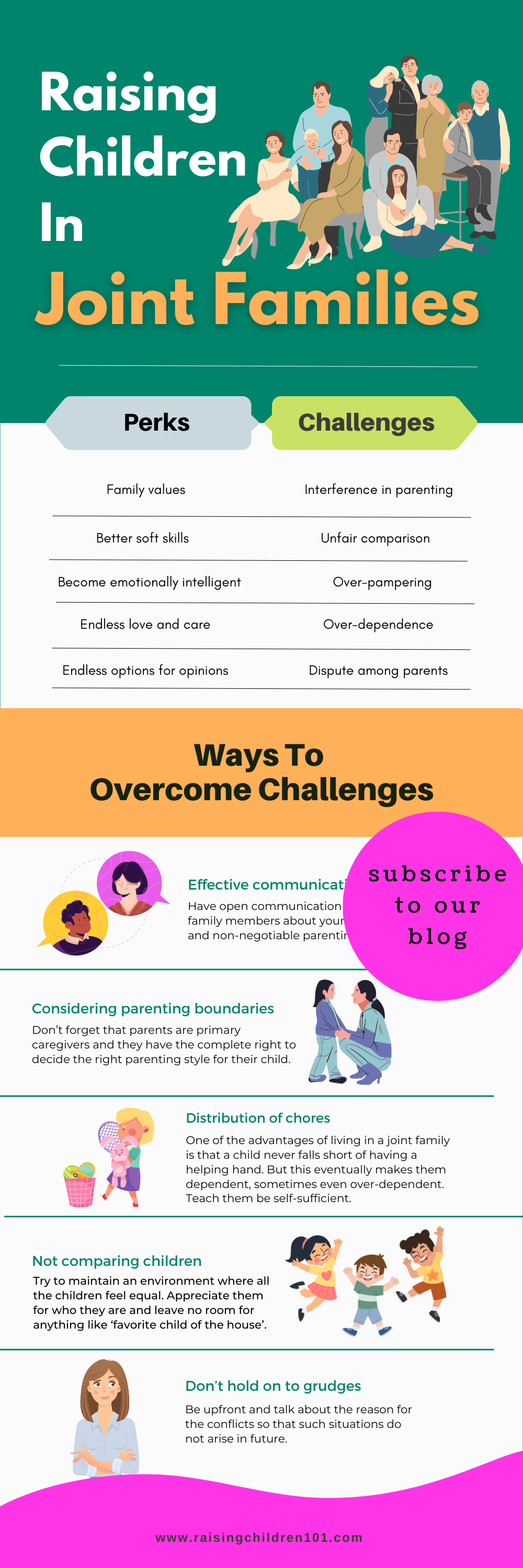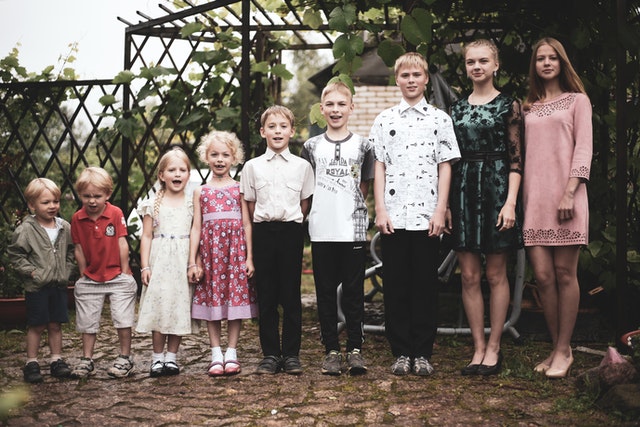Family is the bedrock of a child’s upbringing, providing love, support, and guidance as they navigate the world. In certain cultures, raising children in joint families is a cherished tradition, where multiple generations live together under one roof, creating a close-knit network of relatives. The idea of Vasudhaiva Kutumbakam isn’t new for us, and the fact that people still choose to live in joint families is enough to prove it. Living under one roof means you get to understand about multiple generations, and raising children in joint families gives them exposure to the best of both worlds. While the benefits of joint families are undeniable, they also present unique challenges that parents must navigate to ensure a harmonious and nurturing environment for their children.
Family dynamics impact a child’s development. The interactions, relationships, and values within the joint family setting can greatly influence their emotional well-being, social skills, and overall growth. Understanding the impact of these dynamics is essential for parents seeking to create a supportive and conducive environment for their children’s upbringing.
Perks of raising children in joint families
Of all the family members, children are the ones who are impacted the most by the joint family setup. Children in joint families get nurtured in the best possible way under the shelter of the best caregivers.
1. Family values
Living in a joint family is like having a reservoir of learning. From folklores to ethical values, a child quickly grasps it all. You don’t need to deliberately teach them how to behave in social settings. They imbibe discipline and values by observing others in the family, especially elder children.
2. Better soft skills
Children who grow up in joint families don’t have to wait until they go to school to learn about sharing and teamwork. Because of the diversity a joint family brings with itself, children start learning social skills and soft skills from a very early age. They turn out to be less socially awkward and are generally outgoing. A joint family educates a child beyond books.
3. Become emotionally intelligent
When you are surrounded by a group of people with different personality traits, your child is bound to understand different aspects of human behavior just through observation. They learn how to deal with people, how to be empathetic, and how to be respectful. This automatically improves their emotional intelligence and interpersonal skills.
4. Endless love and care
This goes without saying. A child never falls short of love and affection. They always have someone to reach out to whenever they want, and the feeling of loneliness is almost absent.
5. Endless options for opinions
Another advantage of being a part of a joint family is that you never have a dearth of advice on anything. There will always be someone with the best career advice, friendship advice, etc. Family is there to have your back through thick and thin.
Challenges of raising children in joint families
From making the home their personal playground to play with cousins and siblings to being spoiled by the extra love, children get the best while living in a joint family. But things are not the same for their parents. Like every coin has two sides, a joint family setup also comes with its own set of challenges for parents.
1. Interference in parenting
Every parent has their own way of raising their child, and they don’t like people questioning and interfering in that. Situations of interference are common when other family members become judgmental about your parenting style.
An example of situation is where a child is wrong and when parents try to give them fair punishment for the child’s betterment, grandparents or other members get involved and interfere with your disciplining approach. A child may love this instant gratification, but it isn’t good in the long run. Things like these can be a huge problem when other family members constantly involve themselves, and they seek a unanimous decision in everything.
2. Unfair comparison
Be it physical appearance, academics, behavior, or anything, children often become prey to unhealthy comparisons. This not only makes the child but also the parents underperformers.
It is common to notice a parent comparing a child with their classmates or neighbor’s child. But when such comparisons happen at home, it causes unnecessary stress for both the child and parents. While healthy competition is appreciated, sometimes things like this go south and negatively affect the relationship of children in the family.
3. Over-pampering
If your child was the first-born in their generation or the only child in the house, you would highly resonate with this.
Pampering comes in various forms. From spoiling the child with gifts to being responsible for erratic and undisciplined schedules – all lead to making the child throw tantrums and develop a bad temper.
Over-pampering by grand parents is hands down one of the major struggles of a parent as to stop such pampering one needs to pick up a direct conversation with elderly members of the family, which, in turn, is often considered as disrespectful.
4. Over-dependence
A helping hand is good, but not when it makes you completely dependent. Since grandparents are usually the ones who are free and try to lend a hand to grandchildren in almost everything, they end up making them dependent.
Not only grandparents, since there is no shortage of manpower in a joint family, children are usually relaxed and laid back. They are less likely to engage in household chores. This is clearly visible if you compare a child raised in a nuclear family with one brought up in a joint family. Children raised in nuclear families are far more independent than the children raised in joint families.
5. Dispute among parents
It is normal for children to fight or have arguments with one another while playing. Things are great when they can sort all by themselves; but if parents are introduced in the fight, things don’t remain the same. Often it affects the relationship of the two parents while each tries to defend their child.
Ways to overcome challenges of raising children in joint families
No matter what the challenges are, there’s always a way to get through them and try to establish the desired environment. To overcome the challenges of raising children in joint families, here are some tips and strategies.
1. Effective communication
It’s natural that your child will be showered with love and will be pampered with loads of chocolates, gifts, and what not. While this may spoil the child, the proper way to deal with this is not by blaming either the child or the family members.
Just have open communication about your negotiable and non-negotiable parenting rules. You may say that it’s okay to give chocolates but only when they have earned the chocolates through some actions or activities and not just like that. You need to speak up for the things you are not ready to comprise with your child. It might sound a bold move but will be worth it eventually if you tell them why you want it and have no intentions of offending anyone.
Proper communication will help you establish and maintain boundaries. All you need to keep in mind is to be reasonable in what you do to avoid cold wars in the family. And surprisingly, these include all small and big decisions.
2. Considering parenting boundaries
The way you wish to teach discipline to your child could be completely different from what others expect you to do. Some families believe in traditional methods of corporal punishment, and you, on the contrary, seek the calmer approach and apply positive parenting techniques.
Such differences might cause stress in the family, and the best way is to tackle this to be upfront about your parenting style and be reasonable about your actions. For grandparents, it becomes crucial learn the art of respecting boundaries. Don’t forget that parents are primary caregivers and consider that they have the complete right to take such decisions.
3. Distribution of chores
One of the advantages of living in a joint family is that a child never falls short of having a helping hand. But this eventually makes them dependent, sometimes even over-dependent.
To ensure that you raise independent children, they must learn to take responsibility. Of course, the family will always have their back, but let them be self-sufficient. You may start by asking them to take their personal responsibilities like making their bed, helping with small household chores like grocery shopping, etc.
4. Not comparing children
“How can you underperform in academics, look how your brother always ranks first’” – things like this are common in families, especially when there are many kids in joint families.
There is no denying that healthy comparisons are good as long as it helps to improve. But if you don’t demarcate the proper boundaries, it soon turns into jealousy and eventually rivalry, again a challenge for parents. So, understand each child is unique and that all of them are special.
Try to maintain an environment where all the children feel equal. Appreciate them for who they are and leave no room for anything like ‘favorite child of the house’. You can achieve this by being non-biased with all the children in the house.
5. Don’t hold on to grudges
Arguments are a part of living in a joint family. It could be due to some disagreements or just another heated conversation. But no matter what try to resolve these as soon as possible and move on with a fresh start. Remember toxic relationships impact child’s emotional wellbeing.
Be upfront and talk about the reason for the conflicts so that such situations do not arise in future. Holding on to grudges only worsens your relationship with other family members.
Summary: Raising children in joint families

Conclusion: Raising children in joint families
These are the thumb rules that will help you sail smoothly when raising children in joint families. While it goes without saying that every family comes with its own set of struggles, parents commonly face the issues mentioned above. Thus, to overcome such challenges, you just need to adopt the right coping strategies, and you will be sorted.




